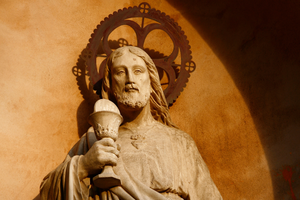The Eucharistic Revival and Synodality
EDITORIAL: Journeying together and encountering Christ are not opposing goals, but are interdependent — and unifying for the life of the Church.

The message Pope Francis shared with a recent delegation of the National Eucharistic Revival’s leadership team was a beautiful bit of catechesis on the Blessed Sacrament. It was also a clear reproach of those who continue to denigrate the Revival for ideological reasons, even attempting to somehow pit it against the Holy Father and his priorities.
In his greeting given on June 19, Pope Francis describes the Eucharistic Revival as “God’s response to the deepest desire of the human heart, the hunger for authentic life” and the presence of God.
Sadly, the Holy Father notes that there are those who believe the Eucharist is “more a symbol than a reality of the Lord’s presence and love.” He laments that “we have lost the sense of adoration in our day” — and that “it is up to the bishops to catechize the faithful about praying through adoration” because “the Eucharist requires it of us.”
Timothy Glemkowski, the executive director of the National Eucharistic Congress, planned for next July in Indianapolis, accompanied the leadership team to the Vatican. He told the Register the Holy Father “talks about the crisis of so many feeling like the Eucharist is just a symbol and not that awareness of the Real Presence,” adding that hearing “these things that have been part of our mission for years now really coming from the mouth of the Holy Father was incredible.”
The Holy Father’s unmistakable support for the Eucharistic Revival — he called it “a significant moment in the life of the Church in the United States” and assured the delegation of his continued prayers for their work — came in sharp contrast to the way a small but vocal minority of American Catholics have treated the Eucharistic Revival at times, even including bishops.
Just three days before the Pope’s audience with National Eucharistic Revival leadership, one Church leader criticized the practice of Eucharistic adoration as “passive.” The remark came in the midst of an attempt to pit the U.S. bishops’ Eucharistic project against Pope Francis’ emphasis on “synodality” — as if having a great reverence and love for the Eucharistic Lord is somehow opposed to a “listening Church.” In fact, even some ideologically motivated reports of the Pope’s meeting with Eucharistic Revival representatives attempted to frame the meeting in a negative light.
Fortunately, a plain reading of Pope Francis’ comments about the Eucharist and the ongoing Eucharistic Revival exposes these ideologically motivated attacks for what they are.
Rather than pitting synodality and the Eucharistic Revival against each other, we should consider ways in which they might be related. Pope Francis’ emphasis on synodality is an emphasis on the shared communion of the Body of Christ — a union that was achieved through Christ’s sacrifice on the cross, which is renewed in every Eucharistic liturgy.
Catholics should be striving to take this “both/and” approach with regard to the Eucharistic Revival and the Synod on Synodality. We should strive to overcome ideological brinksmanship within our Church and, like the disciples on the road to Emmaus, should rediscover how journeying together and encountering Christ in the “breaking of the bread” are not opposing goals, but are interdependent — and unifying for the life of the Church.
- Keywords:
- national eucharistic revival
- synodality
















